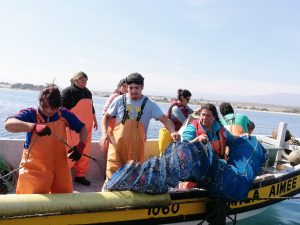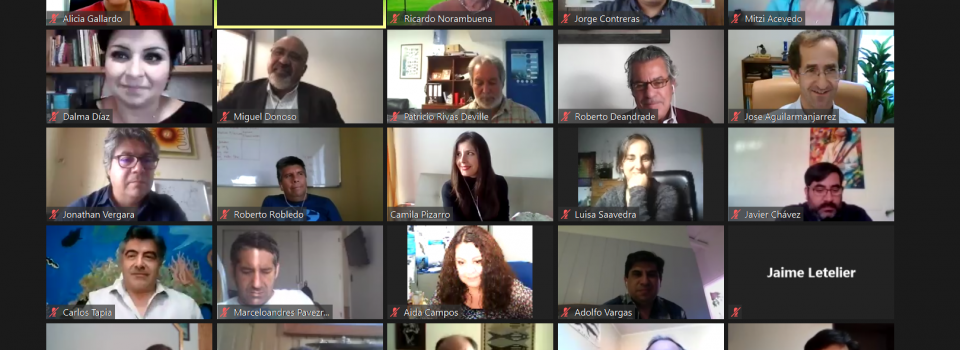Successful Fisheries and Aquaculture Climate Change Workshop
March 23rd, 2021 Among its participants, FAO authorities, Eve Crowley, Fisheries and Aquaculture Undersecretariat, Alicia Gallardo, Environment Undersecretariat, from IFOP Javier Naranjo and Dr. Jaime Letelier
Among its participants, FAO authorities, Eve Crowley, Fisheries and Aquaculture Undersecretariat, Alicia Gallardo, Environment Undersecretariat, from IFOP Javier Naranjo and Dr. Jaime Letelier
On March 18th, a successful and interesting schedule was carried out, within the framework of the Project that the Fisheries and Aquaculture Undersecretariat and Environment’s Ministry have been executing since 2017, called: “Strengthening adaptation capacity of Chilean fisheries and aquaculture sector to climate change ”, which is co-financed with contributions from the Global Environment Fund and implemented by the United NationsFood and Agriculture Organization.
This pioneering initiative in the country has managed to attract the attention of a multiplicity of actors from different sectors. Thus, more than 350 participants from different latitudes, both from Chile and abroad, gathered to witness the event, in which 18 prominent panelists announced different initiatives implemented at the national, regional and local levels and its main results . .
The opening was headed by Javier Naranjo Environment Undersecretariat, who highlighted figures and facts from the projectś results, through which it has been possible to reduce vulnerability and increase artisanal fishing sector and small-scale aquaculture adaptive capacity. In addition, it provided very encouraging information on main climate action initiatives promoted by the government, such as Framework Law on Climate Change, progress in the NDC commitments,development of 4 National Action Plans on Climate Change, ARCLIM Climate Risk Atlas, Long-Term Climate Strategy, t National Adaptation Plan update, Financial Strategy against Climate Change, among others.
FAO Representative, Mrs. Eve Crowley indicated that, “this project in support of chilean institutional capacity and coastal inhabitants awareness regarding sustainable fishing and aquaculture, seeks to generate resilient communities, capable of overcoming upcoming challenges, promoting and enhancing different adaptation practices to face climate change ensuring food of coastal communities and their livelihoods ”.
Among the project achievements, the panelists highlighted the creation of 7 Interinstitutional Working Groups (GTI); an Interoperable Information System Design that systematizes fishing, aquaculture and climate change variables; More than 300 public officials and decision makers and more than 140 actors of artisanal fishing and small-scale aquaculture trained in adaptation to climate change; A participatory environmental monitoring training program; and a deployment of more than 20 experimental initiatives to explore new adaptation practices in pilot coves coastal communities: Riquelme, Tongoy, Coliumo and El Manzano-Hualaihué, which include: experimental crops of woolly, cholga, Japanese oyster , chicorea de mar y pelillo; and a program to improve mussel seed uptake; elaboration of diverse added value products from resources landed in pilot sites; elaboration of tourism strategies of special interests, use accompanying fauna practices; design of dynamic thematic maps that incorporate climate change effects on fisheries and aquaculture; a Program that grants recognition to fishing coves and aquaculture farms in the process of adaptation to climate change, through granting an identity stamp, among others.
At the end of the Seminar, which, beyond disseminating project results, had the purpose of awakening interest and achieving ownership by strategic partners that are essential for its subsequent scaling up and replication, Alicia Gallardo Fisheries and Aquaculture Undersecretariat, recognized and valued obtained results in three components of the project, which indicated that “they are aligned and contribute to policies, programs and projects promoted by SUBPESCA and other public institutions.” In her in-depth speech, she stressed that it is essential to listen to women and men working in fisheries and aquaculture to learn their perspectives, nourish ourselves from their experiences and pay attention to their needs. “We must strengthen territorial governance in the creeks and help to consolidate their community spaces and these challenges must be faced with policies and multidisciplinary work where bridges are established between public sector to resolve communities concrete demands; We must continue working on gender equity and advance in the application of fishing and aquaculture ecosystemic approach; Coastal communities are urgently demanding to improve social infrastructure and productive support.
In the field of climate change, fishermen and aquaculturists of the four pilot coves of the project are demanding access facilitation to data and information, they want to understand what is happening. And, without a doubt, the results that we have seen today can contribute to the Caleta Inteligente (smart cove) initiative that we have been designing and that we will announce very soon. From this initiative we will address the reduction of the digital gap in coastal communities, we will advance in processes digitization , we will promote heritage resources care, we will continue supporting diversification initiatives such as special interest tourism and the recognition of the fundamental role of women in the coves.
Dr. Jaime Letelier, Oceanography and Environment Department head, presented the results of one of the subprojects “Interoperable Information System, which systematizes and integrates fishing, aquaculture and climate change data”.
Among the main results it showed the agreements reached with SERNAPESCA and DIRECTEMAR, the cooperation with Universidad de Concepción, visualization of data obtained by fishermen from the 4 pilot coves as well as the daily satellite image visualization system and the annual trends of indicators. environmental and bio-fisheries along the coast of Chile.
Dr. Letelier highlighted that the system provides free daily satellite images of Temperature and Chlorophyll, reducing the information gap available to artisanal fishermen between Ecuador and the Magallanes region. On the other hand, he explained how the temperature anomalies allow to follow the influence of climatic events such as El Niño and La Niña, the Hot Spot or Climate Change, which at the same time as the Climate Change monitoring indicators allow the Fisheries authority to have indicators for decision-making in the medium and long term.
This platformhe potential is being considered as a relevant component within the system “System of Alert, Prediction and Observation for fisheries resilient to climate change in the Humboldt Current” that the Environmental Defense Fund (EDF) is coordinating and in which the Sea Institute of Peru (IMARPE) and Ecuador Fisheries National Institute (INP).
